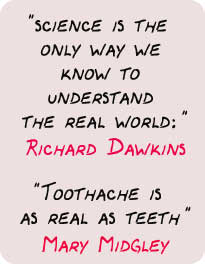|
|
Katalina Groh, Larry Prusak: Some of the world's leading thinkers |
| Two modes of knowing: abstract and narrative |
| a. Scientific triumphalism |
 |
Science's
claim to know it all
A great deal of our knowledge obviously comes from the triumphs of science.
And we should be duly grateful for these contributions to our understanding
and well-being. |
| August Comte
Auguste Comte (1798-1857) presented the following chain of reasoning: "1. Philosophy leads us to prefer science as the highest form of inquiry by getting us to develop theories of truth and rationality that force us to justify our knowledge claims by the rigorous standards of logical reasoning, which, in turn, reveal the inadequacies in our taken-for-granted habits of thought.From Steve Fuller, Thomas Kuhn: A Philosophical History For Our Times, University of Chicago Press, Chicago, 2000, page 281. Colin Blakemore "The
human brain is a machine which alone accounts for all our actions,
our most private thoughts, our beliefs. It creates the state of consciousness
and the sense of self. It makes the mind." Peter Atkins "Although
poets may aspire to understanding, their talents area more akin to entertaining
self-deception. They may be able to emphasize delights in the world,
but they are deluded if they and their admirers believe that their identification
of the delights and their use of poignant language are enough for comprehension.
Philosophers too, I am afraid, have contributed to the understanding
little more than poets... They have not contributed much that is novel
until after novelty has been discovered by scientists... While poetry
titillates and theology obfuscates, science liberates."
Richard Dawkins "The individual organism
... is not fundamental to life, but something that emerges when genes,
which at the beginning of evolution were separate, warring entities,
gang together in co-operative groups as "selfish co-operators". The
individual organism is not exactly an illusion. It is too concrete for
that. But it is a secondary, derived phenomenon, cobbled together as
a consequence of the actions of fundamentally separate, even warring
agents. ... Perhaps the subjective "I", the person that I feel myself
to be, is the same kind of semi-illusion... The subjective feeling of
"somebody in there" may be a cobbled, emergent, semi-illusion analogous
to the individual body emerging in evolution from the uneasy cooperation
of genes." |
| Books and videos on storytelling *** In Good Company : How Social Capital Makes Organizations Work by Don Cohen, Laurence Prusak (February 2001) Harvard Business School Press *** The Social Life of Information, by John Seely Brown, Paul Duguid (February 2000) Harvard Business School Press *** The Springboard : How Storytelling Ignites Action in Knowledge-Era Organizations by Stephen Denning (October 2000) Butterworth-Heinemann *** The Art of Possibility, a video with Ben and Ros Zander : Groh Publications (February 2001) |
| The views expressed on this website are those of the authors, and not necessarily those of any person or organization |
| Site optimized in 800x600: webmaster CR WEB CONSULTING |
|
|
|
|